- Regulatory Status
- RUO
- Other Names
- T lymphocyte-secreted protein I-309, P500, SCYA1, SISe, TCA3
- Ave. Rating
- Submit a Review
- Product Citations
- publications
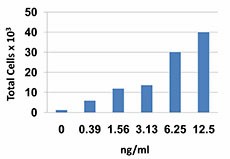
-

BW5147 cells chemoattracted by mouse CCL1.
| Cat # | Size | Price | Quantity Check Availability | Save | ||
|---|---|---|---|---|---|---|
| 584802 | 10 µg | 118€ | ||||
CCL1 was initially identified as a secreted protein derived from activated T cells. CCL1/CCR8 axis is involved in the recruitment of Th2 effector cells in vivo to sites of allergic mucosal inflammation; as a result, there is an increase of CCR8+ CD4 T cell numbers in allergic asthma and a higher concentration of CCL1 in bronchoalveolar lavage of asthmatics patients compared with normal controls. In addition, high levels of CCL1 have been detected in serum of patients with atopic dermatitis. Also, CCL1 is constitutively expressed in normal skin, and CD8 and CD4 CCR8+ cells have been isolated from normal skin. Therefore, it has been suggested that CCL1/CCR8 play a role in skin immunosurveillance. In addition, a more recent publication showed that CCL1 transcript is upregulated in CD4 converted to Tregs by TGF-β in vitro, and this transcriptional upregulation is reversed by IL-6. This data suggests that CCL1 plays a role in Treg conversion. Also, antibodies against CCL1 inhibit the suppressive function of Tregs. Furthermore, the antitumor effect of CpG-ODN plus anti-CCL1 in BALB-neuT mice suggest that neutralization of CCL1 can be used as an adjuvant to antitumor immunotherapy.
Product DetailsProduct Details
- Source
- Mouse CCL1, amino acids Lys24-Cys92 (Accession# NM_011329.3) was expressed in 293E cells.
- Molecular Mass
- The 69 amino acid recombinant protein has a predicted molecular mass of approximately 7.7 kD. The DTT-reduced protein migrates at approximately 16 kD and non-reduced protein migrates at approximately 18-20 kD by SDS-PAGE. The N-terminal amino acid is Lys.
- Purity
- >98%, as determined by Coomassie stained SDS-PAGE.
- Formulation
- 0.22 µm filtered protein solution is in PBS.
- Endotoxin Level
- Less than 0.01 ng per µg cytokine as determined by the LAL method.
- Concentration
- 10 µg size is bottled at 200 µg/mL.
- Storage & Handling
- Unopened vial can be stored between 2°C and 8°C for up to 2 weeks, at -20°C for up to six months, or at -70°C or colder until the expiration date. For maximum results, quick spin vial prior to opening. The protein can be aliquoted and stored at -20°C or colder. Stock solutions can also be prepared at 50 - 100 µg/mL in appropriate sterile buffer, carrier protein such as 0.2 - 1% BSA or HSA can be added when preparing the stock solution. Aliquots can be stored between 2°C and 8°C for up to one week and stored at -20°C or colder for up to 3 months. Avoid repeated freeze/thaw cycles.
- Activity
- Bioactivity was measured by its property to chemoattract mouse BW.5147.G.1.4OUAR.1 cells in a dose dependent manner.
- Application
-
Bioassay
- Application Notes
-
BioLegend carrier-free recombinant proteins provided in liquid format are shipped on blue-ice. Our comparison testing data indicates that when handled and stored as recommended, the liquid format has equal or better stability and shelf-life compared to commercially available lyophilized proteins after reconstitution. Our liquid proteins are verified in-house to maintain activity after shipping on blue ice and are backed by our 100% satisfaction guarantee. If you have any concerns, contact us at tech@biolegend.com.
Antigen Details
- Structure
- Chemokine
- Distribution
- T cells, Th1, Th2, diabetogenic T cells, peritoneal macrophages, peritoneal mesothelial cells, Langerhans cells, monocytes, mast cells, NK cells, endothelial cells, and epithelial cells
- Function
- CCL1 chemoattracts CD4 Th2 cells and plays a key role in the progression of Th2 type hypersensitivity
- Interaction
- T cells, Th2 cells, macrophages, microglia, FOXP3+ CD4 regulatory T cells, skin-homing CLA+T cells, monocytes, NK cells, dendritic cells, endothelial cells, Langerhans DC, and smooth muscle cells
- Ligand/Receptor
- CCR8 (CDw198)
- Biology Area
- Cell Biology, Signal Transduction
- Molecular Family
- Cytokines/Chemokines
- Antigen References
-
1. Miller MD, et al. 1989. J. Immunol. 143:2907.
2. Haque NS, et al. 2004. Blood 103:1296.
3. Gombert M, et al. 2005. J. Immunol. 174:5082.
4. Montes-Vizuet R, et al. 2006. Eur. Respir. J. 28:59.
5. Soler D, et al. 2006. J. Immunol. 177:6940.
6. Gonzalo JA, et al. 2007. J. Immunol. 179:1740.
7. Mutalithas K, et al. 2010. Clin. Exp. Allergy 40:1175.
8. Hoelzinger DB, et al. 2010. J. Immunol. 184:6833. - Gene ID
- 20290 View all products for this Gene ID
- UniProt
- View information about CCL1 on UniProt.org
Related FAQs
- Why choose BioLegend recombinant proteins?
-
• Each lot of product is quality-tested for bioactivity as indicated on the data sheet.
• Greater than 95% Purity or higher, tested on every lot of product.
• 100% Satisfaction Guarantee for quality performance, stability, and consistency.
• Ready-to-use liquid format saves time and reduces challenges associated with reconstitution.
• Bulk and customization available. Contact us.
• Learn more about our Recombinant Proteins. - How does the activity of your recombinant proteins compare to competitors?
-
We quality control each and every lot of recombinant protein. Not only do we check its bioactivity, but we also compare it against other commercially available recombinant proteins. We make sure each recombinant protein’s activity is at least as good as or better than the competition’s. In order to provide you with the best possible product, we ensure that our testing process is rigorous and thorough. If you’re curious and eager to make the switch to BioLegend recombinants, contact your sales representative today!
- What is the specific activity or ED50 of my recombinant protein?
-
The specific activity range of the protein is indicated on the product datasheets. Because the exact activity values on a per unit basis can largely fluctuate depending on a number of factors, including the nature of the assay, cell density, age of cells/passage number, culture media used, and end user technique, the specific activity is best defined as a range and we guarantee the specific activity of all our lots will be within the range indicated on the datasheet. Please note this only applies to recombinants labeled for use in bioassays. ELISA standard recombinant proteins are not recommended for bioassay usage as they are not tested for these applications.
- Have your recombinants been tested for stability?
-
Our testing shows that the recombinant proteins are able to withstand room temperature for a week without losing activity. In addition the recombinant proteins were also found to withstand four cycles of freeze and thaw without losing activity.
- Does specific activity of a recombinant protein vary between lots?
-
Specific activity will vary for each lot and for the type of experiment that is done to validate it, but all passed lots will have activity within the established ED50 range for the product and we guarantee that our products will have lot-to-lot consistency. Please conduct an experiment-specific validation to find the optimal ED50 for your system.
- How do you convert activity as an ED50 in ng/ml to a specific activity in Units/mg?
-
Use formula Specific activity (Units/mg) = 10^6/ ED50 (ng/mL)
 Login / Register
Login / Register 







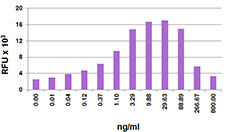
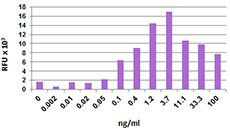
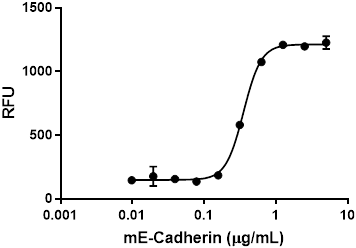
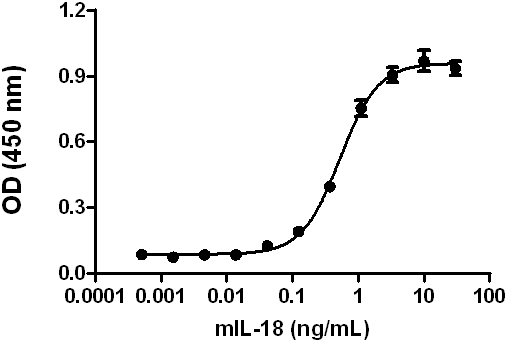



Follow Us